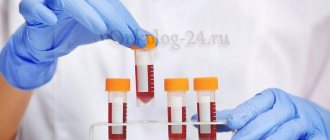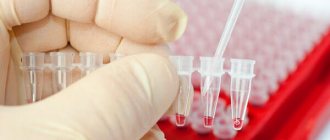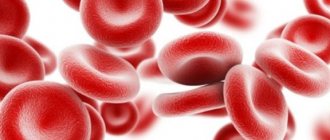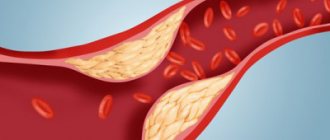Effect of prolactin
So far, science has not fully elucidated the effect of this hormone on the body. It is known to be important for:
- growth and development of mammary glands;
- maturation and release of colostrum;
- increasing the number of milk lobules and ducts;
- conversion of colostrum into milk;
- prolongation of the corpus luteum phase;
- regulation of water-salt metabolism.
In addition, in women it works as a “contraceptive” - it prevents conception during pregnancy and breastfeeding. Prolactin is released and pregnancy does not occur. After weaning the baby from the breast, the likelihood of conception increases again. In men, this hormone, in addition to controlling water-salt metabolism, enhances the release of testosterone and also stimulates sperm growth.
If the level of this hormone is increased compared to the norm, problems with conception may occur.
What causes prolactin to rise?
Many people ask what the hormone prolactin is responsible for in women? It's very simple: it is produced in the cells of the pituitary gland
, which is located in the brain, this hormone appears during pregnancy and breastfeeding.
This hormone is very important during adolescence in girls.
, it is he who is responsible for the growth of the mammary glands and their further development, for breast enlargement during pregnancy, for the appearance of breast milk during breastfeeding. This means that if a woman has nothing to do with bearing a child, the appearance of an excess of such a hormone is dangerous; it can affect the functioning of the adrenal glands.
Prolactin: when to take it?
On what day should you take prolactin? Blood is donated for prolactin on any day of the menstrual cycle - either in the follicular or luteal phase. At the beginning of the cycle, you can combine tests for other hormones (cycle days 2–5 or 5–8). The follicular phase is suitable for testing blood for sex hormones of the pituitary gland - you can simultaneously take a test for FSH, LH and prolactin (days 3–5 of the cycle). Pregnant women usually take this test on the same day as other tests.
If you have been prescribed a test for the hormone prolactin , when to take it does not matter much: the results are interpreted depending on the day of the cycle. The level of this hormone fluctuates slightly during the cycle, so to determine its concentration, you do not need to worry about what day to take the test. Even if the doctor has prescribed a certain day, but it doesn’t quite suit you, check, maybe it will be possible to reschedule the test and your laboratory will test prolactin on a day more convenient according to your schedule.
2 days before taking the test, you need to refrain from:
- sex;
- stress;
- sweet;
- physical activity;
- examination of the mammary glands.
Since the level of this hormone increases during sleep, the test should be taken 2-3 hours after waking up - not earlier. The test must be taken on an empty stomach. Even if an increase in prolactin is recorded, donate blood 1-2 more times: this way you can make sure that this is not a one-time surge in the hormone.
The units of measurement in which prolactin levels are most often determined are ng/ml - nanograms per milliliter. Laboratories can also measure hormone concentrations in µIU/mL—micro international units per milliliter. To convert units of μIU/ml to prolactin ng/ml, you need to divide the value in μIU/ml by 30.3.
Prolactin: normal in women
Depending on what day of the cycle the tests are taken, the norm in women ranges from 4.5–49 ng/ml, or 136–1483 μIU/ml. According to the phases of the menstrual cycle, the values are as follows:
- follicular phase - 4.5–33 ng/ml, or 136–999 μIU/ml;
- ovulatory phase - 6.3–49 ng/ml, or 190–1484 μIU/ml;
- luteal phase - 4.9–40 ng/ml, or 148–1212 μIU/ml.
Increased prolactin in women during pregnancy
Throughout pregnancy, hormone levels change:
- I trimester - 3.2–43.0 ng/ml;
- II trimester - 13.0–166.0 ng/ml;
- III trimester - 13.0–318.0 ng/ml.
From the eighth week, the hormone level begins to increase. Its highest concentration in the blood is approximately 20–25 weeks. Prolactin levels are very important for the development of a child's lungs. Before childbirth, a decrease in the level of the hormone is observed, and its next increase occurs only during breastfeeding.
Prolactin in men: normal
For men, the normal level of the hormone is lower than for women. In a healthy male body, the concentration should be in the range of 2.5–17 ng/ml, or 75–515 µIU/l.
Progesterone
Progesterone is a steroid hormone of the corpus luteum of the ovaries, necessary for all stages of pregnancy. It prepares the endometrium of the uterus for implantation of a fertilized egg, and after its implantation it helps maintain pregnancy.
What are the indications for prescribing a blood test for progesterone in women?
- identifying the causes of menstrual irregularities;
- identifying the causes of infertility;
- identifying the causes of dysfunctional uterine bleeding;
- assessment of the condition of the placenta in the second half of pregnancy;
- diagnosis of true post-term pregnancy.
What preparation is required for a progesterone blood test?
The analysis is carried out on days 22-23 of the menstrual cycle, unless other dates are indicated by the attending physician. Blood is taken in the morning on an empty stomach, that is, when 8-12 hours pass between the last meal and blood collection. You can drink water. If it is not possible to come to the laboratory in the morning, you can fast for at least 6 hours before taking blood, excluding fats from your morning meal.
When donating blood, you must provide the nurse with additional information - about the day of the cycle, weeks of pregnancy, menopause; as well as taking medications that affect the level of hormones in the blood.
What are the deadlines for completing the analysis?
1 day.
What are the normal levels of progesterone in the blood of women?
| Women | Progesterone level, nmol/l |
| Follicular phase | 0,32 — 2,23 |
| Ovulatory phase (mid cycle) | 0,48 — 9,41 |
| Luteal phase | 6,99 — 56,63 |
| I trimester | 8,90 — 468,40 |
| II trimester | 71,50 — 303,10 |
| III trimester | 88,70 — 771,50 |
| Postmenopause | < 0,64 |
Prolactin is elevated: symptoms
If prolactin levels are elevated in a male or female body, symptoms may include the following:
- disrupted menstrual cycle (periods are rare or absent);
- problems with conception;
- decreased sex drive;
- discharge from the mammary glands;
- hair growth on the face, chest, back in women;
- weight gain;
- acne;
- lack of ovulation (in women).
When the hormone level is increased compared to the norm, all of the above symptoms may not always be present. Both low and high prolactin , the symptoms of which are easy to notice, may indicate serious disturbances in the functioning of the body.
Effect on fertility
The pituitary hormones FSH and LH cause ovulation. The production of these hormones is reduced by high levels of prolactin, and pregnancy does not occur. If you cannot get pregnant for more than six months, it makes sense to donate blood.
If the body malfunctions, an increased level of this hormone in women can cause not only “sexual coldness” and unhealthy large breast size, but also breast cancer. If a man has elevated prolactin levels, the following symptoms are observed:
- problems with conception;
- impotence;
- increased size of the mammary glands;
- release of colostrum.
If you suspect you have elevated levels of the hormone, symptoms without test results may not warrant treatment. First of all, take tests that will help determine the cause of the malfunction in the body.
Procedure for laboratory tests
Are there rules for taking a test for prolactin levels in the blood and what should be the preparation? How to take such an analysis correctly and on what day? It is known that when there is an increased level of prolactin in the blood, we can talk about changes in the body such as disease of the pituitary gland, liver, or even the brain. If the level of prolactin in the blood is low, it is worth thinking about the destruction of cells that are secreting, as well as the exhaustion of the entire body, which can result from large blood loss.
Testing for this hormone should be done only when there is a prescription from your doctor. A study of this kind can be prescribed by specialists such as a gynecologist or therapist, as well as an andrologist and endocrinologist. The reason for such an examination may be the patient’s description of the symptoms of his illness.
When the concentration of the hormone prolactin in the blood is low, it makes sense to think about cell destruction.
When should women go for this test? When they are concerned:
- Noticeable enlargement of the mammary glands.
- The release of so-called colostrum.
- Disruption of the menstrual cycle.
- Inability to get pregnant (infertility).
When should men think about their hormone levels? When you are concerned about a decrease in desire (sexual), in advanced cases - impotence and infertility.
There are alarming symptoms that are not associated with a specific gender:
- Body weight increases.
- The mood is consistently depressed.
- Fractures.
- Caries (in violent manifestation).
- Pain in the head area.
- Vision decreases.
If a pituitary adenoma is detected, it is definitely necessary to check the level of prolactin. No matter how the tumor is detected - by MRI or X-ray - it is absolutely necessary to immediately exclude the possibility that this tumor is hormonally active. For this purpose, the described analysis is carried out on the day specified by the doctor.
Prolactin is elevated: reasons
There are two types of hyperprolactinemia:
- physiological (norm);
- pathological (with deviations from the norm).
Physiological hyperprolactinemia causes an increase in prolactin levels in a healthy body for the following reasons:
- pregnancy;
- breastfeeding period;
- intense physical activity;
- deep sleep phase;
- protein-rich diet;
- sexual intercourse;
- emotional overstrain.
Normally, the level of the hormone is increased in men and women early in the morning - between 5 and 7 am. Pathological hyperprolactinemia (an unhealthy increase in hormone levels) can have the following causes:
- pituitary tumors;
- surgical damage to the pituitary stalk;
- radioactive exposure;
- “empty sella” syndrome (compressed pituitary gland);
- hypothalamic tumors;
- damage to the thoracic organs, including operations on the mammary glands;
- benign tumors of the sella turcica;
- endocrine diseases (polycystic ovary syndrome, hypothyroidism, Cushing's syndrome);
- renal and liver failure;
- lack of vitamin B6;
- taking certain medications (including oral contraceptives).
If prolactin is elevated in the body, the reasons may also be associated with obesity. Estradiol is formed in adipose tissue, which in turn provokes an increase in the “lactation hormone”. The more estradiol in the body, the higher the concentration of prolactin. Therefore, most often high levels of the hormone occur in overweight men and women.
When should you get tested for prolactin?
There are actually many reasons to see a doctor. Here are the main signs:
- menstruation stopped from several months to six months;
- breast milk has appeared in the mammary glands, and the woman is not pregnant or in the postpartum period;
- for unknown reasons, visual function is impaired;

- headache constantly and for no reason;
- infertility.
Also, in addition to the above complaints, a woman may be diagnosed with a pituitary adenoma
. Magnetic resonance imaging and computed tomography of the brain can detect this disease. In this case, it is urgent to exclude the hormonal activity of such a neoplasm.
How to lower prolactin?
The doctor determines how to lower the hormone level, taking into account the causes of hyperprolactinemia. If the level of the hormone increased during lactation, its level will decrease as soon as you stop breastfeeding your baby. This type of hyperprolactinemia does not require treatment.
Prolactin is elevated: treatment
In addition to blood tests for hormones, MRI (magnetic resonance imaging) is prescribed. MRI can determine whether high levels of the hormone are associated with the disease: this test helps detect the presence of tumors.
Treatment may include:
- taking medications;
- radiation therapy;
- operation.
The doctor prescribes treatment on an individual basis. At the same time, it takes into account the current state of the body, the presence of allergies to medications, the desire to become pregnant and other factors.
Preparation for the procedure
The procedure requires serious physical and psychological preparation:
- 24 hours before blood sampling, all factors from the physiological group of reasons for increasing the concentration of the substance are excluded;
- the last meal before donating blood occurs 8 hours before and contains a minimal amount of protein;
- It is not recommended to take medications without first consulting a doctor (any foreign substances in the blood may affect the reliability of the result).
Methods for normalizing prolactin
If the MRI does not confirm the presence of tumors, the doctor prescribes drugs that act on dopamine receptors.
In cases where drugs do not help, surgery or radiation therapy is performed.
Folk remedies reduce the concentration of mammotropin, acting exclusively on nerve receptors. Soothing chamomile and mint teas, decoctions of valerian, St. John's wort, motherwort, and lemon balm reduce emotional stress and stabilize a person's psychological state.
The test is prescribed by a medical professional for prevention or when symptoms of certain diseases appear. The procedure requires careful preparation - all factors that influence changes in the result are excluded, an individual survey is conducted with women in order to determine on what day of the menstrual cycle they need to take a prolactin test. The concentration rate depends on gender, age, trimester of pregnancy, menstrual phase and is individual in nature. Often they cannot determine the reliability of the indicators the first time, so a repeat analysis is prescribed.
Complexes with this research
Female hormones.
Follicular phase Assessment of the hormonal status of a woman in the follicular phase 3,480 R Composition Fitness control of sports nutrition Assessment of liver function, hormone levels and metabolism when taking sports nutrition 2,810 R Composition
Fitness monitoring Examination to select physical activity and monitor the body’s condition 4,000 RUR Composition
IN OTHER COMPLEXES
- Male infertility. Extended examination RUB 19,090
- Preventative check-up 6,530 RUR
- Male hormones RUB 3,940
- Advanced male anti-aging diagnostics RUR 22,840
- Anti-aging diagnostics. Hormonal balance RUB 3,990










